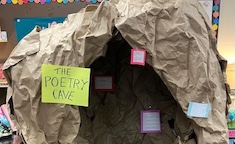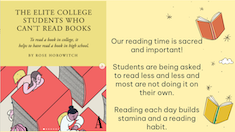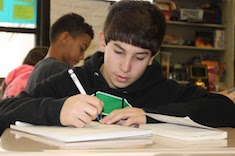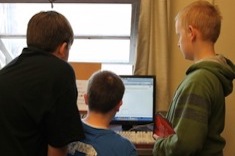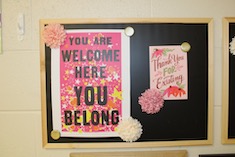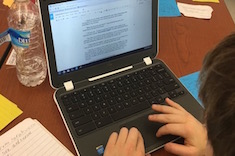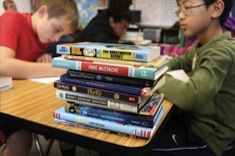12th
Latest Content
From Meet-Cutes to Happily-Ever-Afters: A Romance Genre Study
Gretchen Schroeder decided to capitalize on her high school students’ interest in romance novels and designed a genre study. Romance novels may not seem like the most obvious choice for academic rigor, but they offered a shared language to talk about love, power, identity, and relationships—conversations that matter both on and off the page.
Why High School Students Need Cardboard Castles and Poetry Caves
Gretchen Schroeder makes a case for offering creative opportunities for high school students to play with language. She names three components to ensure a creative, playful experience is successful: student choice, ownership, and inspiring invitations.
Making the Case for Reading
Gretchen Schroeder makes a case for independent reading to administrators, families, and her high school students. Gretchen offers notebook entries, scholarly articles, and whole-class activities to help everyone know the benefits of consistent, daily independent reading.
Hidden Lessons: Are We in Control of Who We Become? (Part 4)
In this final installment of the “Hidden Lessons” series, Gretchen Schroeder turns to perhaps the most complicated question of all: To what extent are we in control of who we become? It’s a question that touches on issues of identity, personal responsibility, outside influence, and human nature, all of which are especially relevant during adolescence. Gretchen includes another booklist to support this conversation.
Hidden Lessons: Why Do Relationships Matter? (Part 3)
By the time they reach high school, many students have learned how to survive change, but not always how to make sense of it. They’ve lost friendships, switched schools, experienced family transitions, or even dealt with grief. While they may not always talk openly about these experiences, they often find reflections of them in the books they read. Gretchen Schroeder continues her series about using literature to help students learn important social and relationship skills. She includes student work and a booklist.
Hidden Lessons: How Do We Cope with Challenges and Change? (Part 2)
Literature gives students a safe space to learn about struggle, resilience, and emotional growth without requiring personal vulnerability. Gretchen Schroeder offers a way to focus students’ independent reading to explore coping with challenges and change in life. You won’t want to miss the included young adult booklist. This is the second installment of a series.
Hidden Lessons: Integrating Social-Emotional Learning in an Authentic Way
We know there is a need to teach more lessons about wellness, and we know that it is sometimes difficult to teach those lessons in a way that students will accept. Gretchen Schroeder offers three questions for teachers to consider as they plan to incorporate social and emotional learning standards into their classrooms. This is the first installment of a series.
Fostering Classroom Dialogue
Gretchen Schroeder shares her big takeaways from reading Inspiring Dialogue. Now more than ever, we need to help students express themselves and claim their voices, because the classroom is one of the last places where we can engage in dialogue about big questions with those who might not share our beliefs.
Zooming In and Stepping Back
Gretchen Schroeder creatively leads her students in chronicling key scenes from a novel so they can evaluate which ones are important and use it as a reference throughout their discussions.
I Was Wrong About…
Gretchen Schroeder invited her students to write personal essays inspired by the 2022 New York Times series “I Was Wrong About.” Gretchen shared with her students (and now shares with us) the way she was wrong about her mammy collection.
Literacy Skills in All Content Areas
Julie Cox reminds us that each content area is full of opportunities for students to give shape to their ideas in all kinds of ways that don’t look like traditional essays but still help them develop their literacy skills.
Love Poetry: Take It or Leave It, but Tell Me Why
In today’s world we are bombarded with opinions that are increasingly polarizing, and this is especially true for teens and their opinions of love poems. Gretchen Schroeder uses love poems to help students learn how to back up an opinion with criteria, details, and examples.
Considerations for AI in the Classroom
Julie Cox wrestles with the use of AI to support high school writers. In this article she offers filters for educators to determine the role of AI in their classrooms.
Literary Salons: Book Clubs, Elevated
Inspired by the 17th-century popularity of literary salons, Gretchen Schroeder changed the usual book club routine for her high school students. Literary salons allow people to explore big topics and ideas together without reading the same book. They can create engaging discussions, expose students to new ideas and books, and give them the chance to learn from one another in a relaxed way.
Putting Political Talk into Perspective
Gretchen Schroeder encourages teachers to help students know how to talk politics by establishing a positive mindset and attitude when approaching conversations.
Let’s Begin
Gwen Blumberg reflects on the community developed at a writing retreat and encourages teachers to consider the community of learners they will intentionally nourish this school year.
Examining Power Dynamics
Gretchen Schroeder leads her students to consider the power and privilege in the texts they read. By creating a power continuum, students become more aware of issues of power and oppression in society. Once this happens, they can move to discussions of how to take action for positive social change.
Using Drama Games to Approach Difficult Conversations
Gretchen Schroeder is committed to having conversations about race and racism with her high school students. Sometimes it’s difficult to engage students, so Gretchen used drama games as a means to think about concepts metaphorically, then ground them within the text, and, finally, have students apply them to their own lives and the world.
Kintsugi
Given an assignment to break a china bowl and rebuild it allowed Gretchen Schroeder to engage in the Japanese art of kintsugi. What surprised her were the lessons she learned about growth and innovation in her teaching practice.
Poetry Strategies for Partners and Groups
Gretchen Schroeder offers three ideas for partners or small groups to engage with poetry. Not only will they get creativity flowing, but they will also lift writers’ energy.
Detours: A Reminder of the Humanity of Students
Gretchen Schroeder reminds us of the importance of checking in with students and gauging how they are feeling—and then responding with authenticity and joy.
Increasing Student Choice
We want students to be lifelong learners, eager to grow, and equipped to face challenges. For this to happen, we have to let the classroom be a place that reflects these qualities. Julie Cox offers three innovative ways to leave choice in the hands of students. In turn, they learn to trust themselves and their learning, and believe that they are capable of finding answers.
Author Moves: More Than “Lots of Detail”
Julie Cox deconstructs craft moves—literally and figuratively—with her high school writers. If you are looking to move conversations about craft beyond “The author used a lot of good details,” then you’ll want to try Julie’s suggestions.
Considerations for AI in the Classroom
Gretchen Schroeder considers the positive ways AI will influence her high school English classroom.
Does Gender Impact Reader Engagement?
Gretchen Schroeder questions whether the protagonist’s gender influences her students’ engagement with a text. Using the dystopian novel Legend, which has two protagonists of different genders, Gretchen gathered feedback from her students. What she discovered was that a reader’s engagement with a text has more to do with empathy than with gender. You’ll love Gretchen’s new way of selecting whole-class texts for her students.
Considering Positionality and Developing New Sight Lines
Gretchen Schroeder shares a powerful approach to reading response to help students consider their positionality in a scene. Your identity, your thoughts, and your experiences influence the way that you relate to a text. This is your positionality as a reader, and it’s important to consider your positionality within a text because it explains how and why we come to certain conclusions as we read.
How Long Does This Have to Be?
Students often question how long a piece of writing needs to be. Gretchen Schroeder shares a strategy that changed the focus of writing projects from length to meaning.
Putting Together the Pieces of a Classroom (Classroom Organization)
When Julie Cox moves into a smaller classroom, she realizes that to make it a room where students learn and thrive, she needs to shift her mindset. Rather than simply putting things where they fit, she asks three questions to make intentional decisions that will support learning.
Writing from the Heart
Kate Mills and Tara Barnett pour their hearts into teaching writers, but when Tara loses her family dog, she is reminded that writing is the thing that helps us understand what’s most important.
Three Ways to Engage Your Students in Reading and Writing Poetry This Spring
Gretchen Schroeder offers three poetry-writing activities to take the pressure off the writing process by using another poet’s structure and/or words as a starting point. You’ll be amazed by how deep and personal the resulting poems can become. Download a PDF for students to collect lines for a cento poem.
Browse Content By
Type
Category
- Assessment Tools
- Big Fresh Archives
- Booklists
- Choice Numeracy
- Classroom Design
- Common Core
- Community Building
- Conferring
- Content Literacy
- Digital Literacy
- English Language Learners
- Equity
- Family Relations
- Free Samples
- Guiding Groups
- Leadership
- Literacy Coaches
- Mentor Texts
- Minilessons
- New Teacher Mentors
- Podcasts
- Poetry
- Quote Collections
- Reading Strategies
- Self Care
- Struggling and Striving Learners
- Talking and Listening
- Teacher Study Groups
- Teaching Reading
- Teaching Writing
- Word Study and Vocabulary
Author
- Melissa Quimby
- Nawal Qarooni
- Gwen Blumberg
- Julie Cox
- The Lead Learners
- Hannah Tills
- Josie Stewart
- Ruth Metcalfe
- Mallory Messenger
- Becca Burk
- Jodie Bailey
- Vivian Chen
- Mary Brower
- Tiffany Abbott Fuller
- Stephanie Affinito
- Ruth Ayres
- Leigh Anne Eck
- Heather Fisher
- Shari Frost
- Julie Johnson
- Suzy Kaback
- Gigi McAllister
- Shirl McPhillips
- Melanie Meehan
- Cathy Mere
- Debbie Miller
- Tara Barnett and Kate Mills
- Tammy Mulligan
- Dana Murphy
- Bitsy Parks
- David Pittman
- Brenda Power
- Heather Rader
- Matt Renwick
- Mandy Robek
- Christy Rush-Levine
- Gretchen Schroeder
- Jen Schwanke
- Brian Sepe
- Katherine Sokolowski
- Stella Villalba
- Jennifer Vincent
Grade Level
Choice Literacy Membership
Articles
Get full access to all Choice Literacy article content
Videos
Get full access to all Choice Literacy video content
Courses
Access Choice Literacy course curriculum and training


